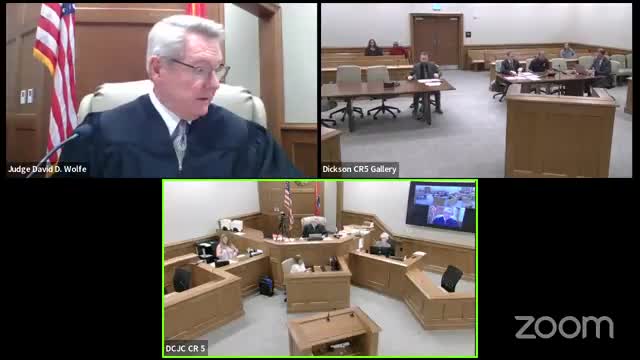Judge sets $250,000 bond, GPS monitoring for man charged in 2010 killing
September 26, 2025 | Judge David D. Wolfe State of Tennessee, Judicial, Tennessee
This article was created by AI summarizing key points discussed. AI makes mistakes, so for full details and context, please refer to the video of the full meeting. Please report any errors so we can fix them. Report an error »

A judge on Monday set bond at $250,000 and imposed GPS monitoring and no‑contact restrictions for Landon Eugene Gray, who was arraigned on a first‑degree murder charge arising from the 2010 death of a man found shot and burned in a pickup truck.
The court reviewed Gray’s criminal history, multiple defense witnesses who vouched for his character and steady employment, and prosecution points about prior convictions that include felony offenses and prior probation revocations. The judge cited state bond‑setting criteria and noted the seriousness of the charged offense, the defendant’s lengthy record and the inconsistencies in the defendant’s statements to investigators when explaining the reasons for the bond level.
Gray’s father, Ronnie Mallory, and Michelle McCaleb, the mother of two of Gray’s children, both testified on his behalf, telling the court Gray has deep community ties, multiple children and a job awaiting him if he is released. McCaleb said Gray has been a father to her children and has lived in the area; Mallory described family history and urged that Gray would be a reliable appearance risk.
Investigators testified the case is a long‑running cold case that was re‑examined in 2020; Sergeant Kirk Davidson described the victim’s body as recovered burned in a Dodge pickup and said the medical examiner found bullet wounds. Davidson testified Gray gave multiple statements over the years that placed him at the scene; in a later interview Gray told investigators he saw another person shoot the victim, and described a transfer of the firearm in a way that the prosecution says supports the charge.
The judge weighed statutory factors — length of residence, employment, family ties, criminal history, risk of willful flight and the apparent likelihood of conviction — and concluded the nature of the charge and the defendant’s earlier violent convictions counseled a significant bond. The judge ordered GPS monitoring and restricted the defendant’s movement to home, work and attorney meetings; the court set a status date in January and signed an order containing the GPS, no‑contact and travel conditions.
Defense counsel asked for a lower bond and argued Gray has lived in the area for years, has steady employment and that two family members were prepared to vouch and provide residence. The prosecutor emphasized the seriousness of the offense, Gray’s past felony convictions (including convictions for weapons and drug offenses and at least one revoked probation) and the strength of the state’s evidence that the defendant was at or near the scene in 2010.
The judge said the totality of the record supported setting bond at $250,000 to reasonably assure Gray’s appearance and protect the public, and added the GPS condition to ensure location monitoring if bond is posted. The court ordered the clerk to prepare a written order with the GPS and movement restrictions.
The court reviewed Gray’s criminal history, multiple defense witnesses who vouched for his character and steady employment, and prosecution points about prior convictions that include felony offenses and prior probation revocations. The judge cited state bond‑setting criteria and noted the seriousness of the charged offense, the defendant’s lengthy record and the inconsistencies in the defendant’s statements to investigators when explaining the reasons for the bond level.
Gray’s father, Ronnie Mallory, and Michelle McCaleb, the mother of two of Gray’s children, both testified on his behalf, telling the court Gray has deep community ties, multiple children and a job awaiting him if he is released. McCaleb said Gray has been a father to her children and has lived in the area; Mallory described family history and urged that Gray would be a reliable appearance risk.
Investigators testified the case is a long‑running cold case that was re‑examined in 2020; Sergeant Kirk Davidson described the victim’s body as recovered burned in a Dodge pickup and said the medical examiner found bullet wounds. Davidson testified Gray gave multiple statements over the years that placed him at the scene; in a later interview Gray told investigators he saw another person shoot the victim, and described a transfer of the firearm in a way that the prosecution says supports the charge.
The judge weighed statutory factors — length of residence, employment, family ties, criminal history, risk of willful flight and the apparent likelihood of conviction — and concluded the nature of the charge and the defendant’s earlier violent convictions counseled a significant bond. The judge ordered GPS monitoring and restricted the defendant’s movement to home, work and attorney meetings; the court set a status date in January and signed an order containing the GPS, no‑contact and travel conditions.
Defense counsel asked for a lower bond and argued Gray has lived in the area for years, has steady employment and that two family members were prepared to vouch and provide residence. The prosecutor emphasized the seriousness of the offense, Gray’s past felony convictions (including convictions for weapons and drug offenses and at least one revoked probation) and the strength of the state’s evidence that the defendant was at or near the scene in 2010.
The judge said the totality of the record supported setting bond at $250,000 to reasonably assure Gray’s appearance and protect the public, and added the GPS condition to ensure location monitoring if bond is posted. The court ordered the clerk to prepare a written order with the GPS and movement restrictions.
View full meeting
This article is based on a recent meeting—watch the full video and explore the complete transcript for deeper insights into the discussion.
View full meeting
